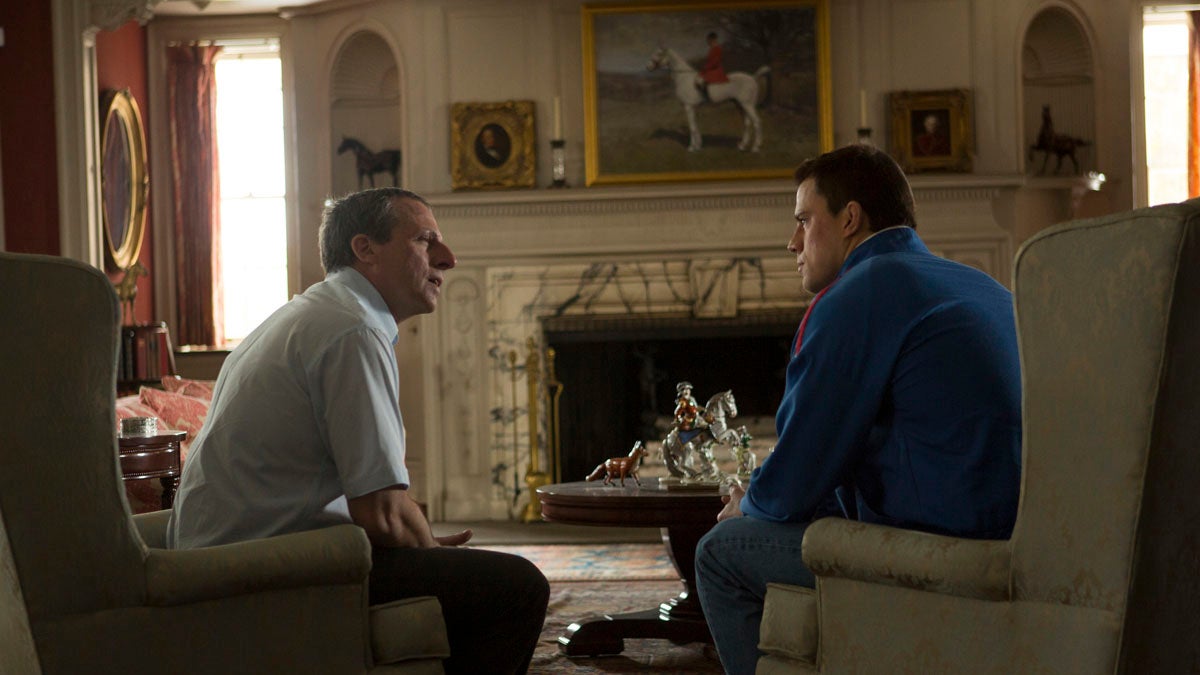As du Pont heir wrestles with ambition and insanity, ‘Foxcatcher’ imitates life
Listen
This image released by Sony Pictures Classics shows Steve Carell, left, and Channing Tatum in a scene from 'Foxcatcher.' (AP Photo/Sony Pictures Classics, Scott Garfield)
When John E. du Pont, heir to the vast du Pont fortune, was on trial on charges of killing Olympic wrestler David Schultz in 1996, the prosecution and defense both agreed he was deranged.
The reasons for one of the most notorious murders in Pennsylvania were never fully determined.
But a film opening this weekend casts some light on the troubled scion of the famous Delaware family believed the trees on his 400-acre estate, Foxcatcher Farm in Delaware County, could move.
He installed razor-wire inside his mansion to deter the spies he was certain were crawling inside the walls. He dressed like the Dalai Lama because that’s who he believed he was.
He also saw himself as the savior of American wrestling.
“He held himself out as the coach of world-class wrestlers, when his coaching abilities were limited,” said Bill Ordine, a journalist who covered the arrest and trial of du Pont for the Philadelphia Inquirer. “It was a status conferred upon him because he was writing the checks.”
Through his dedication to wrestling and his $100 million fortune, du Pont turned his family’s Foxcatcher estate in Newtown Square into a state-of-the-art athletic training facility. It was one of the best in the country and one that, du Pont hoped, would become the home of the national wrestling team. He kept a staff and a roster of athletes on a payroll at Foxcatcher.
The movie about his rising ambitions in the wrestling world and his descent into madness, “Foxcatcher,” stars Steve Carrell, Channing Tatum, and Mark Ruffalo.
“There’s this entire infrastructure that was dependent on John du Pont for paychecks,” said Ordine, who co-wrote “Fatal Match,” a true-crime book about the case. “Frankly, it would have been difficult for anyone to step up and say, ‘John, you’re not right. You need help.’ That person would have been gone.
“The tragedy of all this was, if there was one person who could rein him in it was David Schultz. There are points in John’s life where he would have considered Schultz his best friend. David Schultz was the guy who could keep Foxcatcher on track.”
The trial that followed the killing never determined why du Pont turned on Schultz. As du Pont descended into mental illness, he may have became jealous of Schultz, who garnered more respect in the wrestling world. Schultz was also considering leaving Foxcatcher to coach at Stanford University.
Du Pont’s court case was delayed until he could be determined mentally stable enough to stand trial. He pleaded not guilty by reason of insanity, but was found guilty of third-degree murder and sentenced to 30 years.
Du Pont died in prison in 2010, after serving 13 years.
WHYY is your source for fact-based, in-depth journalism and information. As a nonprofit organization, we rely on financial support from readers like you. Please give today.


